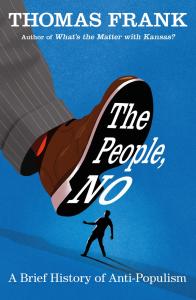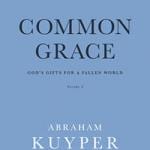Thomas Frank made waves in 2005 with the publication of his book What’s the Matter with Kansas? I mean, he may have made waves before that. I don’t know. But that’s when he made the kinds of waves that I noticed as a student/graduate student in Political Science. Now he’s out with a new book digging into the bigger picture underlying his earlier book about populism and the forces arrayed against it.
The People, No: A brief History of Anti-Populism is exactly what the subtitle claims: an overview of the resistance to the late 19th Century American populist movement (and Party) and how Frank sees that resistance passing down the generations to our own time. This book is well-written, interesting, and clearly something that Frank is deeply passionate about. If you’re interested in contemporary politics, American history, or the question of the relationship between the people and political power, you should definitely pick up this book.
That said, I think there is at least one major problem with this book. Namely, Frank defines “populism” in a way that isn’t terribly helpful. Specifically, he applies it to a set of policy proposals promoted by the Populist Party of the 1890s.
“Populism was one of the first of the great political efforts to tame the capitalist system… The Populists were the people who blasted those smug assumptions [of the elites] to pieces, forcing the country to acknowledge that ordinary Americans who were just as worthy as bankers or railroad barons were being ruined by an economic system that in fact answered to no moral laws.” (11)
Frank points out that this isn’t always the way the term is used:
“From the very beginning, then, populism had two meanings. There was Populism as its proponents understood it, meaning a movement in which ordinary citizens demanded democratic economic reforms. And there was Populism as its enemies characterized it: a dangerous movement of groundless resentment in which demagogues led the disreputable.” (13)
No doubt there is truth to both of these points. But I think Frank has made a methodological error here. (And full disclosure, I am both NOT a historian of the topic or era he’s writing about, and I am very much an anti-Populist, though not of the sort he’s writing about in this book. So take my dissent for what it’s worth.) Frank wants to define “populism” according to the Populist Party Platform. And as far as it goes, I think that’s fair enough. That gives us a few ideas whose history can be traced–the Farm Bill, health care reform, tax rates, etc–from the 1890s until today.

The problem is that Frank’s identification of “populism” with this specific form of “Populism” (note the capitalization change!) is that he is confusing policy results with means. Small ‘p’ populism is, in my read of the affair, much better defined as “a way of accomplishing policy goals” rather than “a set of policy goals themselves.” That is, the Populist Party had the specific things it wanted to work for, say, economic reform. But it also had the idea that the decision makers with regard to those policies should also be the people themselves as much as possible. Sometimes goals and means came together: the people should have more power, so the 17th Amendment was born and Senators since then have been elected by the people of the state instead of chosen by state legislatures (this was a bad Amendment–see? told you I was anti-populist!).
But! By hanging his definition of ‘populism’ on policy positions, it seems that Frank guts the means of populism of any reasonable form or definition. Let’s say for example that in the Obamacare case a few years back the Supreme Court had done what the Obama Administration desperately wanted it to do and declared that healthcare is a right which the government must provide, rather than Obamacare being a tax which Congress can levy or not according to whatever it decides (and leaving aside what I think about the Chief Justice’s attempt at compromise here). Had the Court gone that direction, the one branch of government most distant from the people would by Frank’s definition be the most “populist” branch of government. The Supreme Court, though intentionally and purposefully cut off from democratic processes and passions, would be doing the work of ‘populism.’
By contrast, I think the Oregon referendum in 2002 where the voters overwhelmingly rejected universal healthcare (78% to 21%–though they’re voting on something like it again next year, so who knows what the future holds?) would neatly count as a policy decided on by populist means, even if the result is counter to one of Frank’s core definitions of the term.
And this explains how Frank can so handily deny that there is any such thing as ‘right-wing populism.’ Trump wasn’t a real populist, he was only a “phony populist” using terms that didn’t apply to him for the purposes of winning an election. And you know, I kind-of just want to give Frank this one, since I say something similar about Trump calling himself a ‘conservative’ or ‘Republican’ or ‘Christian’ or any number of other things. The problem is, this refusal to acknowledge the reality of right-wing populism leads to a serious gap in the book. Frank jumps from Reagan (yet another ‘phony populist,’ in Frank’s view) to Trump:
“The disgust I felt that Election Day made me physically ill, and so I hope you will excuse me if I skip over all the preposterous variations on the populist theme worked in the years since then by such flag-waving champions of the working man as Oliver North, Newt Ginbrich, Rush Limbaugh, Bill O’Reilly, Glenn Beck, Sarah Palin; or by George Bush’s son Dubya; or by the NRA, or by Fox News, or by Rick Santelli and the Tea Party movement. I am sick of them all.” (214)
In one sense I’m sympathetic here. Each side is certainly disgusted with the other these days. We shouldn’t be, but we are. The problem is that the “Election Day” in question isn’t the 2016 election but rather was the 1988 election of George H.W. Bush. Granted, I was 5 at the time and don’t remember whether it was a really disgusting election from personal experience. But in retrospect it’s hard to say that that was the real-breaking point, even on the Right. (And yes, I had to look up who Rick Santelli is–who watches CNBC anyway?)
My point is that in sticking to policies rather than means, Frank has his ‘out’ to not have to deal with what’s going on across the aisle from him. And that makes his book that much worse. I get that he doesn’t like right-wing populism (I don’t particularly care for it in its current form myself), but that’s not the same thing as following up with ‘therefore it’s not real populism anyway.’
Again: I think The People, NO is a good book and worth reading, but be aware of what you’re getting into.
A concluding thought for Christians (and to prove that I didn’t forget what kind of blog this is). This issue of the distinction between policy and means is something that we need to keep in mind–especially those on my side of the theological spectrum (i.e. theological conservatives). It is important to have the right doctrine; but it is also important to enact that doctrine in the right way. It might be that a bad belief or practice has worked its way into your local church’s government. You and I can agree that this belief or practice needs to be changed, but we should also remember that it needs to be changed in the proper way. Heck, we might even disagree on what the proper way is. As a congregationalist I’m going to want to talk about member’s meetings and a vote (yet another overlap with populism), while another believer might hold to the presbyterian structure and want to talk about getting the session onboard. In either case, we have to remember that the means matters as much as the policy itself. To forget that is ultimately to undermine our own argument, and The People, NO is a good case study in that–in addition to being a good overview of anti-Populism.
Dr. Coyle Neal is co-host of the City of Man Podcast an Amazon Associate (which is linked in this blog), and an Associate Professor of Political Science at Southwest Baptist University in Bolivar, MO











